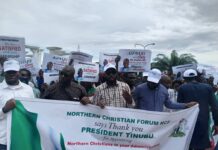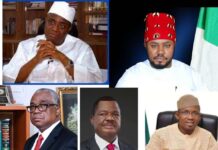A News analysis by Obike Ukoh,
Before the inauguration of the board of the Revenue Mobilisation Allocation and Fiscal Commission (RMAFC) by President Muhammadu Buhari, workers of the commission had carried out a protest to complain about the consequences of an “incomplete board’’.
The workers during their Wednesday, June 6, 2018 protest, said the absence of a board affected the performance of the commission.
The RMAFC was established by law to monitor the accruals into and disbursement of revenue from the federation account, and to review from time to time, the revenue allocation formula and principles in operation to ensure conformity with changing realities.
The commission is also expected to advise the federal, state and local governments on fiscal efficiency and methods by which their revenue is to be increased, among others.
Mr Martins Adeoye, Chairman, Senior Staff Association of the agency, said that instead of 37 commissioners, representing the 36 states of the federation and the Federal Capital Territory, the commission had only seven.
He also said the core functions of the commission were threatened.
“One of our core functions is to carry out oversight functions of the revenue collecting agencies of Federal Inland Revenue Service (FIRS), Nigerian Customs Service (NCS), Nigerian National Petroleum Corporation (NNPC) and Ministry of Finance.
“We are supposed to collect data from them to ensure that what accrues to the federation account is the actual amount, but with poor funding and the few commissioners on ground, how do we do that?
“We have been receiving letters since the beginning of the year asking us to wake up to our responsibilities.
“So, the main aim of this protest is to appeal to the President to please constitute the board and assist us in funding the commission well so that we can discharge our responsibilities adequately,’’ said Adeoye.
Mr Elias Mbam, the immediate past chairman of the commission completed his tenure in November 2015, was re-appointed by President Muhammadu Buhari in 2016, but his name was not immediately sent to the Senate for confirmation.
The name of Mbam and other members of the commission were eventually sent to the Senate that confirmed them, while Buhari inaugurated them on Thursday, June 27.
Buhari at the inauguration of Mbam alongside the other 30 commissioners charged them to be fair and just to all tiers of government.
The president urged them not to compromise the commission’s constitutional mandate for whatever reasons.
Buhari also enjoined the commission to work hard toward meeting the Federal Government’s target of lifting 100 million Nigerians out of poverty in the next 10 years.
He said: “The mandate of the commission is very wide and has an important role for our country’s economy. The commission must be fair and just to the three tiers and arms of government without compromising its core mandate.
“In my speech on June 12 Democracy Day, I informed Nigerians that this administration has laid the foundation for transforming our country and liberating our people from the shackles of poverty by putting policies and measures to integrate our rural economies to the national economic grid.
“Our measure is to extend credit facilities currently available, to be able to encourage and support domestic production of basic goods and reduce our reliance on imported goods.
“I set a target for our country to lift 100 million Nigerians out of poverty in 10 years. This commitment is to further challenge the RMAFC to rise to its constitutional responsibilities and mandate,’’ he said.
The president also charged the members of the commission to concentrate more on expanding the other sources of revenue like non-oil sources, including solid minerals.
He urged them to use all legal ways and means to strengthen the commission’s monitoring mechanism and block leakages of revenue from the federation account.
He said that they should also ensure that all relevant laws and regulations on revenue collections and remittances were fully complied with and appropriate sanctions meted to defaulters.
He called on the National Assembly to put in place “relevant enabling laws that shall guarantee the commission the legal ability to ensure that defaulters of revenue laws are appropriately sanctioned’’.
Mbam, who spoke to State House correspondents at the end of the swearing-in, said the commission would work towards increasing the revenue shared by federal, state and local governments.
He said that the president was emphatic in tasking the commission to deliver on its mandate, adding that they will work towards that.
“We need to increase the sources of revenue to the federation account; in other words, we will concentrate more efforts on how to increase the size of cake for allocation to the three tiers of government, instead of struggling to share a shrinking cake.
“So, the commission will key into the diversification programme of the Federal Government with a view to finding other sources of revenue that will increase resources to the federation account.
“One of our responsibilities is to review the revenue allocation formula and I am saying that we will deliver on our mandate.
“The issue is not just to add and subtract; it derives through a process; whatever you get is derived through a process; more responsibilities, more money,’’ Mbam said.
At a maiden meeting with the commissioners, Mbam reiterated his resolve to increase the size of the “national cake’’ as well as come out with new revenue sharing formula.
Mbam said that his focus during his second tenure would be to ensure the diversification of the economy as well as ensure that all sectors contribute more to the growth of the nation’s economy.
The RMAFC boss said that the commission would also review the remuneration of political office holders in the country to reflect the current economic realities.
“We are not going to leave any of the items in our mandate. We are going to address all issues in the mandate.
“And that is why we are going to be more concerned with increasing the size of the different sources of revenue rather than fight and dissipate energy over sharing of revenue that is getting smaller,’’ he said.
Mbam said that the nation’s revenue sharing formula, which determines how much of the revenue generated goes to the federal, state and local governments, would be revisited.
He recalled that in 2015, the commission conducted a nationwide consultation with key stakeholders and came up with a new revenue sharing formula which was presented to the then President.
“However, nothing has been heard of it. The then President did not present it to the National Assembly to be passed into law,’’ he said.
Mbam said that the issue would be revisited and the new commissioners would be further briefed so they could advise on the best possible way forward.
According to the RMAFC boss, the revenue formula has not been rejected. It is inconclusive.
Stakeholders say that the current RMAFC board, headed by Mbam, would perform as he was in a familiar terrain.
RMAFC under Mbam in 2013, organised workshops in the six geo-political zones in the country for the purpose of sensitising the public on the need to diversify the economy and increase the size of the national purse.
At the inauguration of the workshop entitled: “Economic Diversification for Sustainable Development’’ in Asaba, Mbam said there was danger in running mono economy.
He urged the states and local governments in the country to improve their revenue generation and ensure fiscal efficiency with a view to reducing over-dependence on monthly allocation.
“Currently, oil and gas resources drive the nation’s economy; these hydrocarbon resources are exhaustible, non-renewable and vulnerable to international price volatility and politics.
“Therefore, we must diversify in order to ensure sustainable means of funding our national development and reduce the over-dependence on oil and gas revenue,’’ he said.
He noted that the workshop would give the governments and stakeholders in each zone the opportunity to share experiences and explore strategies of exploiting and developing the various peculiar resources in their respective states.
Mbam also told the National Conference, convoked by then President Goodluck Jonathan in 2014, that the commission lacked the powers to monitor how funds allocated to various establishments were spent.
Mbam was summoned to explain the fat salaries paid to political office holders, especially members of the National Assembly.
He recalled that in 2002, the commission was taken to court for monitoring the use of money already allocated to tier of government.
Mbam said that the Supreme Court, in a lead judgment read by Justice Niki Tobi, ruled that the commission’s act was in contradiction of its mandate, which should be monitoring accruals into the federation account and ensuring that the beneficiaries got their duties.
“The court rules that it was not our responsibility to monitor how monies disbursed to the tiers of government are being spent.
“Although it is not our wish to go against the ruling of the Supreme Court; we feel strongly that our job should not end in monitoring the disbursement of revenue.
“We should be able to check how judiciously the recipients have applied the resources at their disposal, but unfortunately, the laws do not allow us to do that.
“If the commission is to be able to satisfactorily deal with its responsibilities, there is need for its act to be amended, while it is better funded and motivated,’’ he said.
Stakeholders say that President Muhammdu Buhari was right in reappointing Mbam, but want the National Assembly to cooperate with RMAFC to strengthen its act to enable it perform on its mandate, especially increasing the size of distributable cake.











